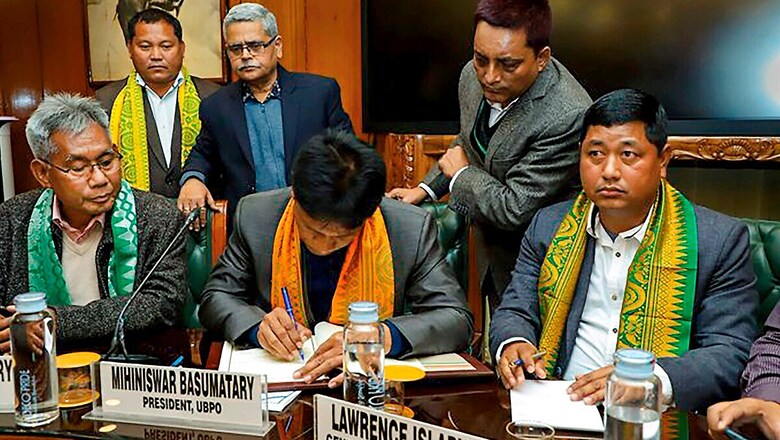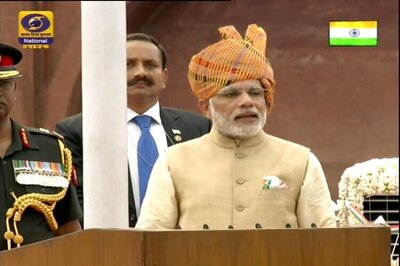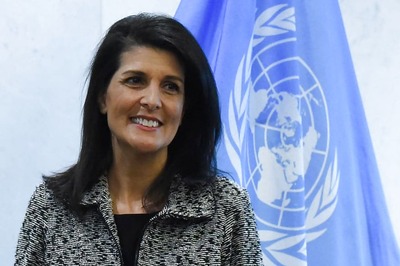
views
The Bharatiya Janata Party (BJP)-led Centre is still sitting on the Bodo Accord, more than six months after it signed the “historic” agreement with the aim to end decades-long armed conflicts in areas dominated by the indigenous Bodo community in Assam.
While the Covid-19 pandemic may have played spoilsport, the BJP’s long pause has raised undue apprehensions in the minds of the people given that several agreements signed in the past, including the 1985 Assam Accord, have not been fully implemented yet. The issue assumes significance ahead of the crucial Bodoland Territorial Council (BTC) elections, the schedule of which is likely to be announced soon.
Assam governor Jagdish Mukhi, who is the constitutional head of the tribal council under the Sixth Schedule of the Constitution, took over its administration since the term of the elected body led by the Bodoland People’s Front (BPF) ended on April 27. The BTC elections that were scheduled for April 4 have been deferred because of the nationwide lockdown triggered by the pandemic.
The BPF, which is a partner of the BJP-led coalition government in Assam, has ruled the council for three consecutive terms. However, it has been suspicious of the BJP’s intentions since the signing of the peace agreement with factions of the National Democratic Front of Bodoland (NDFB) and the All Bodo Students’ Union (ABSU) on January 27.
While the NDFB had led an armed separatist movement since the late 1980s, seeking to create a “sovereign Bodoland”, the ABSU had been demanding a separate state comprising Bodo-dominated areas on the north bank of the Brahmaputra in Assam.
BPF-BJP cold war
Weeks after the signing of the accord, BPF chief Hagrama Mohilary, a former militant of the now-defunct Bodo Liberation Tigers (BLT), had expressed his displeasure in so many words: “The new accord only changes the name of BTC to Bodoland Territorial Region (BTR). As it gives us nothing, we won’t use BTR as a part of our vocabulary.”
The accord promises to replace the existing Bodoland Territorial Area Districts (BTAD) with BTR that will have more administrative powers. Even the number of districts would also be increased to nine from the existing four.
The only person who hogged the limelight during and after the signing of the accord was then ABSU president Pramod Boro, something that did not go down well with the BPF leadership. An influential student leader, Boro was instrumental in bringing the NDFB factions to the negotiation table, leading to the signing of the accord.
In February, Boro joined the United People’s Party Liberal (UPPL), a regional party formed in 2016, to take on the Mohilary-led BPF in the upcoming polls. “We have unanimously made Pramod Boro the president of the party because he is a key signatory to the Bodo pact and it is his duty and responsibility to work for implementation of its clauses,” former Rajya Sabha member and UPPL founder Urkhao Gwra Brahma had said at a meeting in Baksa district on February 25.
He also indicated that the UPPL was open to an alliance with the BJP, much to the discomfiture of the BPF. “We sincerely think it is the moral responsibility of the BJP to work hand in hand with the signatories of the pact, which the party materialised, for effective implementation of the clauses,” Brahma said.
In March, more than 30 top leaders from different NDFB factions joined the UPPL at a function held at Dotma in Kokrajhar, making it a formidable force against the BPF.
As if that were not enough, the BJP also announced its decision to go solo in the BTC polls and field its candidates in all the 40 seats. It was perhaps a clear signal to the Mohilary-led BPF that the upcoming elections would not be a cakewalk for it unlike the previous ones.
To make matters worse for the BPF, the UPPL alleged irregularities to the tune of Rs 1,000 crore in various departments in the past 15 years. It has also urged the Assam governor to recommend a probe by the Central Bureau of Investigation (CBI) into the alleged scam.
The Bodo Accord
The agreement signed in January this year was the final Bodo Accord. The first one, signed with the ABSU in 1993, led to the creation of a Bodoland Autonomous Council with limited political powers. A decade later, the second accord was signed with the militant outfit Bodo Liberation Tigers (BLT), leading to formation of a Bodoland Territorial Council (BTC) with four districts of Assam — Kokrajhar, Chirang, Baksa and Udalguri — together called BTAD.
In the past decade, the Centre released almost Rs 750 crore “over and above the normal plan assistance” to BTC areas to “develop socio-economic infrastructure in Bodo Territorial Council (BTC) area”. While Kokrajhar witnessed rapid development, it is said that the remaining three districts were left to fend for themselves. The final accord promises a Rs 1,500-crore economic package, aimed at boosting the overall socio-economic uplift of the Bodos in Assam.
The Bodos are the third-largest linguistic community in the state after the Assamese and the Bengalis. There are 14.16 lakh Bodo speakers out of the 3.1 crore population in Assam, according to the 2011 Census.




















Comments
0 comment